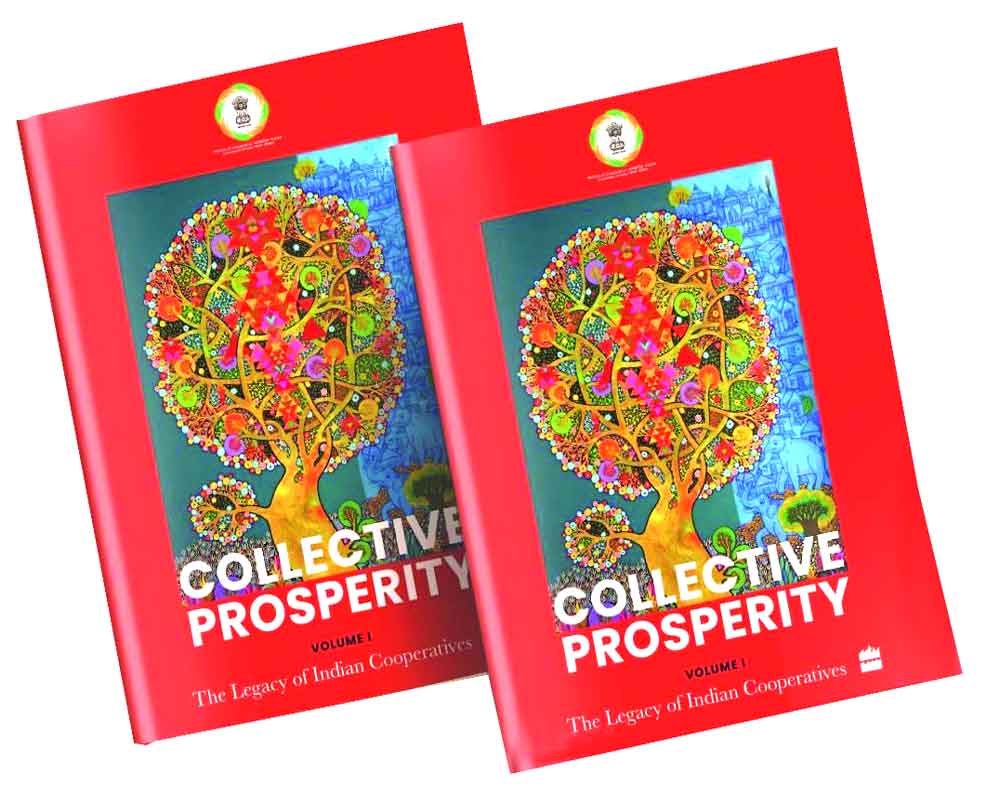Publisher: HarperCollins
Author: Vaikunth Mehta National Institute of Cooperative Management team
Pages: 217 | Price: Rs 799
This coffee table book is not just a collection of stories but a testament to the resilience, empowerment, economic growth, and social embeddedness achieved by cooperatives across India. It also serves as a guidepost for the future as India strives to become a global leader BY ARCHANA JYOTI
The coffee table book ‘Collective Prosperity: The Legacy of Indian Cooperatives', is all about recognizing and celebrating the achievements of Indian cooperative societies over the 75 years, taking readers on a tour of as many successful cooperatives from diverse sectors.
Recently unveiled by Union Home and Coperation Minister Amit Shah in the national capital, the book is compiled by Pune-based Vaikunth Mehta National Institute of Cooperative Management (Vamnicom), a national institute under the aegis of the National Council for Cooperative Training (NCCT) and promoted by the Union Cooperation Ministry.
The volume is the maiden effort by the institute highlighting the best practices in the sector to help the other aspirants to take a cue.
One is therefore little surprised, as we delve into its pages, we embark on a journey treaded by historic cooperatives to the likes of India Coffee House, lesser known gems Looms of Ladakh to the Uralungal Labour Cooperative and iconic ones including Amul, IFFCO, Krishak Bharati Cooperativm and National Consumer Cooperative Federation (NCCF) to name a few. Spread throughout the landscape of the country, these entities are silently working to bring prosperity while opening new opportunities for the individual and for the group to reach their individual and common goals, aligned with the vision of "Sahakar se Samriddhi '' as envisioned by Prime Minister Narendra Modi, as also has been pointed out by Vamnicom’s Director Hema Yadav who has played a significant role in the book's preparation.
It is a valuable resource for individuals and communities looking to actively participate in cooperative endeavors.
The remarks of Union Cooperative Secretary Gyaneshwar Singh in his Foreword rightly emphasize the significance of the Indian cooperative system which is one of the biggest in the world particularly in supporting agriculture and allied sectors with almost 30 crore members forming the backbone of the rural ecosystem serving mainly small and marginal farmers, landless labourers, handloom weavers, fishermen, rural and urban poor, SCS, STs and other backward classes.
It needs to be mentioned here that India is home to staggering 8.5 lakhs such cooperatives- comprising one-fourth of the total number of such entities in the world. Cooperation has undoubtedly been a way of life for our forefathers who advocated 'vasudhaiva kutumbakam' from times immemorial. Some of the world's best known cooperatives in various sectors are in India which are continuously transforming the lives of our local communities. For instance, Asia’s first cooperative sugar factory, Padmashri Dr Vithalrao Vikhe Patil Sahakari Sakhar Karkhana Limited is at a small village Pravaranagar, Ahmednagar district of Maharashtra. Similarly, India’s first women’s federation, the Gujarat State Women’s SEWA Co-operative Federation Limited was formally established with an aim to support its members in capacity-building for management, marketing and policy and advocacy interventions with key stakeholders.
The Dhundi Solar Pump Irrigators’ Cooperative Enterprise (SPICE) established in 2016 at Dhundi, in Anand district, Gujarat is the world’s first-ever enterprise to use solar power to run their irrigation pumps while SWaCH is country’s first wholly-owned cooperative of self-employed waste collectors in Pune, Maharashtra. Kerala-based AYCOOPS is India’s first cooperative media production house in the cooperative sector which, unlike the traditional cooperatives, operates like a start-up New-age Eco-friendly Cooperatives.
Commendably, these cooperatives belong to different parts of the country, which is an indicator of a fair distribution of development across the
land even though a lot still remains to be done in this respect.
For instance, as the book extends its reach to highlight cooperative hospitals in India, it is revealed that most of them are located in Maharashtra, Karnataka, Kerala, and Andhra Pradesh. this calls for spreading in populated States like Uttar Pradesh, Bihar, and Odisha to fill the widening demand-supply gap in the sector.
In tough times like those during the Covid-19 crisis when the entire world was swept by economic slowdown painting a gloomy future, AMUL, MILKFED, NAFED, MARFED, and other organizations provided necessary services to the people and the farmers despite the supply chain being disrupted by the lockdown.
The narrative also touches upon the significance of cooperative banks, exemplified by the Saraswat Bank, and health cooperatives, providing a holistic view of the diverse roles cooperatives play in India's economic and social landscape.
The impact of cooperatives on poverty alleviation, food and nutritional security, social integration, and employment generation is acknowledged, portraying them as social instruments of development, complimented by the recent initiatives of the Ministry to fortify the sector's growth.
For instance, by expanding the scope of cooperative activities and integrating them into various facets of the economy, the aim is to create a dynamic ambience that resonates with the aspirations of the younger generation while drawing their energy and ideas.
In essence, this compact collection not only shines a spotlight on the past achievements of Indian cooperatives but also serves as a guidepost for the future, as India strives to become a global leader.
No doubt, the cooperative sector can be a springboard propelling India towards ‘Atmnirbharta’ (self-reliant).


























